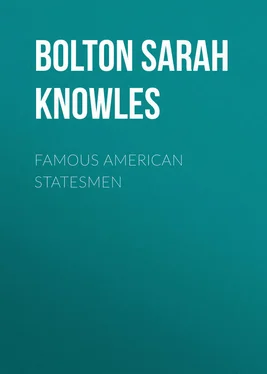Sarah Bolton - Famous American Statesmen
Здесь есть возможность читать онлайн «Sarah Bolton - Famous American Statesmen» — ознакомительный отрывок электронной книги совершенно бесплатно, а после прочтения отрывка купить полную версию. В некоторых случаях можно слушать аудио, скачать через торрент в формате fb2 и присутствует краткое содержание. ISBN: , Жанр: foreign_prose, foreign_antique, foreign_language, на английском языке. Описание произведения, (предисловие) а так же отзывы посетителей доступны на портале библиотеки ЛибКат.
- Название:Famous American Statesmen
- Автор:
- Жанр:
- Год:неизвестен
- ISBN:http://www.gutenberg.org/ebooks/39012
- Рейтинг книги:5 / 5. Голосов: 1
-
Избранное:Добавить в избранное
- Отзывы:
-
Ваша оценка:
- 100
- 1
- 2
- 3
- 4
- 5
Famous American Statesmen: краткое содержание, описание и аннотация
Предлагаем к чтению аннотацию, описание, краткое содержание или предисловие (зависит от того, что написал сам автор книги «Famous American Statesmen»). Если вы не нашли необходимую информацию о книге — напишите в комментариях, мы постараемся отыскать её.
Famous American Statesmen — читать онлайн ознакомительный отрывок
Ниже представлен текст книги, разбитый по страницам. Система сохранения места последней прочитанной страницы, позволяет с удобством читать онлайн бесплатно книгу «Famous American Statesmen», без необходимости каждый раз заново искать на чём Вы остановились. Поставьте закладку, и сможете в любой момент перейти на страницу, на которой закончили чтение.
Интервал:
Закладка:
Young Washington, with his brave heart, was willing to undertake the journey, and started September 30, 1753, with horses, tents, and other necessary equipments. They found the rivers swollen, so that the horses had to swim. The swamps, in the snow and rain, were almost impassable. At last they arrived at the forts, early in December. Washington delivered his letter to the French, and an answer was written to the governor.
On December 25, Washington and his little party started homeward. The horses were well-nigh exhausted, and the men dismounted, put on Indian hunting-dress, and toiled on through the deepening snow. Washington, in haste to reach the governor, strapped his pack on his shoulders, and, gun in hand, with one companion, Mr. Gist, struck through the woods, hoping thus to reach the Alleghany River sooner, and cross on the ice. At night they lit their camp-fire, but at two in the morning they pursued their journey, guided by the north star.
Some Indians now approached, and offered their services as guides. One was chosen, but Washington soon suspected that they were being guided in the wrong direction. They halted, and said they would camp for the night, but the Indian demurred, and offered to carry Washington's gun, as he was fatigued. This was declined, when the Indian grew sullen, hurried forward, and, when fifteen paces ahead, levelled his gun and fired at Washington. Gist at once seized the savage, took his gun from him, and would have killed him on the spot had not the humane Washington prevented. He was sent home to his cabin with a loaf of bread, and told to come to them in the morning with meat. Probably he expected to return before morning, and, with some other braves, scalp the two Americans; but Washington and Gist travelled all night, and reached the Alleghany River opposite the site of Pittsburg.
Unfortunately, the river was not frozen as they had hoped, but was full of broken ice. All day long they worked to construct a raft, with but one hatchet between them. After reaching the middle of the river the men on the raft were hurled into ten feet of water by the floating ice, and Washington was saved from drowning only by clinging to a log. They lay till morning on an island in the river, their clothes stiff with frost, and the hands and feet of poor Gist frozen by the intense cold. The agony of that night Washington never forgot, even in the horrors of Valley Forge.
Happily, the river had grown passable in the night, and they were able to cross to a place of safety. He came home as speedily as possible and delivered the letter to Governor Dinwiddie. His journal was sent to London and published, because of the knowledge it gave of the position of the French. The young soldier of twenty-one had escaped death from the burning straw in surveying, from the Indian's gun, and from drowning. He had shown prudence, self-devotion, and heroism. "From that moment," says Irving, in his delightful life of Washington, "he was the rising hope of Virginia." And he was the rising hope of the new world as well.
The polite letter brought by Washington to the governor had declared that no Englishmen should remain in the Ohio valley! Dinwiddie at once determined to send three hundred troops against the French, and offered the command to Washington. He shrunk from the charge, and it was given to Colonel Fry, while he was made second in command. Fry soon died, and Washington was obliged to assume control. He was equal to the occasion. He said, "I have a constitution hardy enough to encounter and undergo the most severe trials, and, I flatter myself, resolution enough to face what any man dares, as shall be proved when it comes to the test."
The test soon came. In the conflict which followed he was in the thickest of the fight, one man being killed at his side. He wrote to his brother, "I heard the bullets whistle, and, believe me, there is something charming in the sound." Years afterward, he said, when he had long known the sorrows of war, "If I said that, it was when I was young."
At Great Meadows, below Pittsburg, he was defeated by superior numbers, and obliged to evacuate the fort, but the Virginia House of Burgesses thanked him for his bravery.
The next year, England sent out General Braddock, who had been over forty years in the service, a fearless but self-willed officer, to take command of the American forces. Washington gladly joined him as an aide-de-camp. They set out with two thousand soldiers, toward Fort du Quesne (Pittsburg). The amount of baggage astonished Washington, who well knew the swamps and mountains that must be crossed, but Braddock could not be influenced. He remarked to Benjamin Franklin, "These savages may indeed be a formidable enemy to raw militia, but upon the king's regular and disciplined troops, sir, it is impossible they should make an impression." How great an "impression" savages could make upon the "king's regular and disciplined troops" was soon to be shown.
The march was exceedingly difficult. Sometimes a whole day was spent in cutting a passage of two miles over the mountains. Washington urged that the Virginia Rangers be put to the front, as they understood Indian warfare. The general haughtily opposed it, and the regulars in brilliant uniforms, bayonets fixed, colors flying, and drums beating, swept over the open plain to battle, July 9, 1755.
Suddenly there was a cry, "The French and Indians!" The Indian yell struck terror to the hearts of the regulars. They fired in all directions, killing their own men. A panic ensued. Braddock tried to rally his men; even striking them with the flat of his sword. Five horses were killed under him. At last a bullet entered his lungs, and he fell, mortally wounded. Then the men fled precipitately, falling over their dead comrades. Out of eighty-six officers, twenty-six were killed and thirty-six wounded. Nearly half of the whole army were dead or disabled. The Virginia Rangers covered the retreat of the flying regulars, and thus saved a remnant. Braddock, bequeathing his horse and servant, Bishop, to Washington, died broken-hearted, moaning, "Who would have thought it!.. We shall better know how to deal with them another time." Washington tenderly read the funeral service, and Braddock was buried in the new and wild country he had come to save.
Washington escaped as by a miracle. He wrote his brother, "By the all-powerful dispensations of Providence, I have been protected beyond all human probability or expectation; for I had four bullets through my coat, and two horses shot under me, yet escaped unhurt, though death was levelling my companions on every side of me." Through life, this man, great in all that mankind prize, loved and believed in the Christian religion. Agnosticism had no charms for him.
Washington returned to Mount Vernon temporarily broken in health, and his fond mother, who was living at the old homestead, wrote begging that he would not again enter the service. In reply he said, "Honored Madam," for thus he always addressed her, "if it is in my power to avoid going to the Ohio again, I shall; but if the command is pressed upon me by the general voice of the country, and offered upon such terms as cannot be objected against, it would reflect dishonor on me to refuse it; and that, I am sure, must and ought to give you greater uneasiness than my going in an honorable command."
Braddock's defeat electrified the colonies. Governor Dinwiddie at once called for troops, and Washington was made "commander-in-chief of all the forces raised or to be raised in Virginia." For two years he protected the people in the attacks of the Indians; his heart so full of pity that he wrote the governor, "I solemnly declare, if I know my own mind, I could offer myself a willing sacrifice to the butchering enemy, provided that would contribute to the people's ease." No wonder that such self-sacrifice and unselfishness won the homage of the State, and later of the nation.
Читать дальшеИнтервал:
Закладка:
Похожие книги на «Famous American Statesmen»
Представляем Вашему вниманию похожие книги на «Famous American Statesmen» списком для выбора. Мы отобрали схожую по названию и смыслу литературу в надежде предоставить читателям больше вариантов отыскать новые, интересные, ещё непрочитанные произведения.
Обсуждение, отзывы о книге «Famous American Statesmen» и просто собственные мнения читателей. Оставьте ваши комментарии, напишите, что Вы думаете о произведении, его смысле или главных героях. Укажите что конкретно понравилось, а что нет, и почему Вы так считаете.












